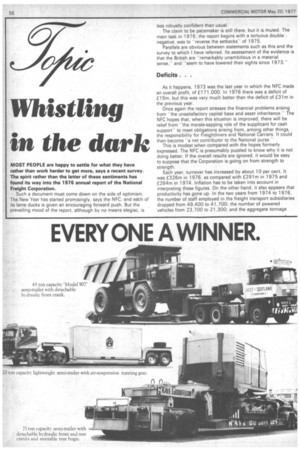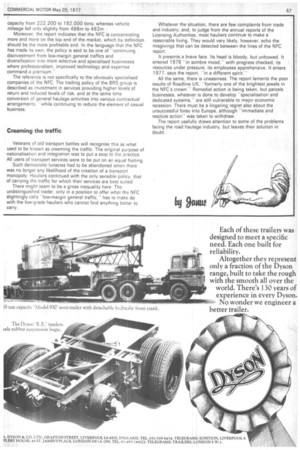Whistling in the dark
Page 58

Page 59

If you've noticed an error in this article please click here to report it so we can fix it.
MOST PEOPLE are happy to settle for what they have rather than work harder to get more, says a recent survey. The spirit rather than the letter of these sentiments has found its way into the 1976 annual report of the National Freight Corporation.
Such a document must come down on the side of optimism. The New Year has started promisingly, says the NFC: and each of its lame ducks is given an encouraging forward push. But the prevailing mood of the report, although by no means elegiac, is less robustly confident than usual.
The claim to be pacemaker is still there, but it is muted. The main task in 1 976, the report begins with a tortuous double . negative, was to "reverse the setbacks" of 1975.
Parallels are obvious between statements such as this and the survey to which I have referred. Its assessment of the evidence is that the British are -remarkably unambitious in a material sense," and "seem to have lowered their sights since 1973."
Deficits . .
As it happens, 1973 was the last year in which the NFC made an overall profit, of £171,000. In 1976 there was a deficit of £15m, but this was very much better than the deficit of £31m in the previous year.
Once again the report stresses the financial problems arising from "the unsatisfactory capital base and asset inheritance.'" The NFC hopes that, when this situation is improved, there will be relief from "the morale-sapping role of the supplicant for cash supportto meet obligations arising from, among other things, the responsibility for Freightliners and National Carriers. It could then become "a net contributor to the National purse.'"
This is modest when compared with the hopes formerly expressed. The NFC is presumably puzzled to know why it is not doing better. If the overall results are ignored, it would be easy to suppose that the Corporation is going on from strength to strength.
Each year, turnover has increased by about 10 per cent. It was £326m in 1976, as compared with £291m in 1975 and • E264m in 1974. Inflation has to be taken into account in interpreting these figures. On the other hand, it also appears that productivity has gone up. In the two years from 1974 to 1976, the number of staff employed in the freight transport subsidiaries dropped from 49,400 to 41,700; the number of powered vehicles from 23,700 to 21,300; and the aggregate tonnage capacity from 222,200 to 192,000 tons; whereas vehicle mileage fell only slightly from 488m to 482m.
Moreover, the report indicates that the NFC is concentrating more and more on the top end of the market, which by definition should be the more profitable end. In the language that the NFC has made its own, the policy is said to be one of "continuing disinvestment from low-margin general traffics and diversification into more selective and specialised businesses where professionalism, improved technology and expertise command a premium."
The reference is not specifically to the obviously specialised companies of the NEC. The trading policy of the BRS group is described as investment in services providing higher levels of return and reduced levels of risk, and at the same time conversion of general haulage activities into various contractual arrangements, "while continuing to reduce the element of casual business.
Creaming the traffic
Veterans of old transport battles will recognise this as what used to be known as creaming the traffic. The original purpose of nationalisation and integration was to put a stop to the practice. All users of transport services were to be put on an equal footing.
Such democratic lunacies had to be abandoned when there was no longer any likelihood of the creation of a transport monopoly. Hauliers continued with the only sensible policy, that of carrying the traffic for which their services are best suited.
There might seem to be a gross inequality here. The undistinguished trader, only in a position to offer what the NFC slightingly calls How-margin general traffic,'" has to make do with the low-grade hauliers who cannot find anything better to carry. Whatever the situation, there are few complaints from trade and industry; and, to judge from the annual reports of the Licensing Authorities, most hauliers continue to make a reasonable living. They would very likely, however, echo the misgivings that can be detected between the lines of the NFC report.
It presents a brave face. Its head is bloody, but unbowed. It entered 1976 "in sombre mood," with progress checked, its resources under pressure, its employees apprehensive. It enters 1977, says the report, "in a different spirit."
All the same, there is uneasiness. The report laments the poor results of Roadline UK, "formerly one of the brightest jewels in the NFC's crown." Remedial action is being taken, but parcels businesses, whatever is done to develop -specialisation and dedicated systems,are still vulnerable to major economic recession. There must be a lingering regret also about the unsuccessful foray into Europe, although "immediate and resolute action" was taken to withdraw.
The report usefully draws attention to some of the problems facing the road haulage industry, but leaves their solution in doubt.




























































































